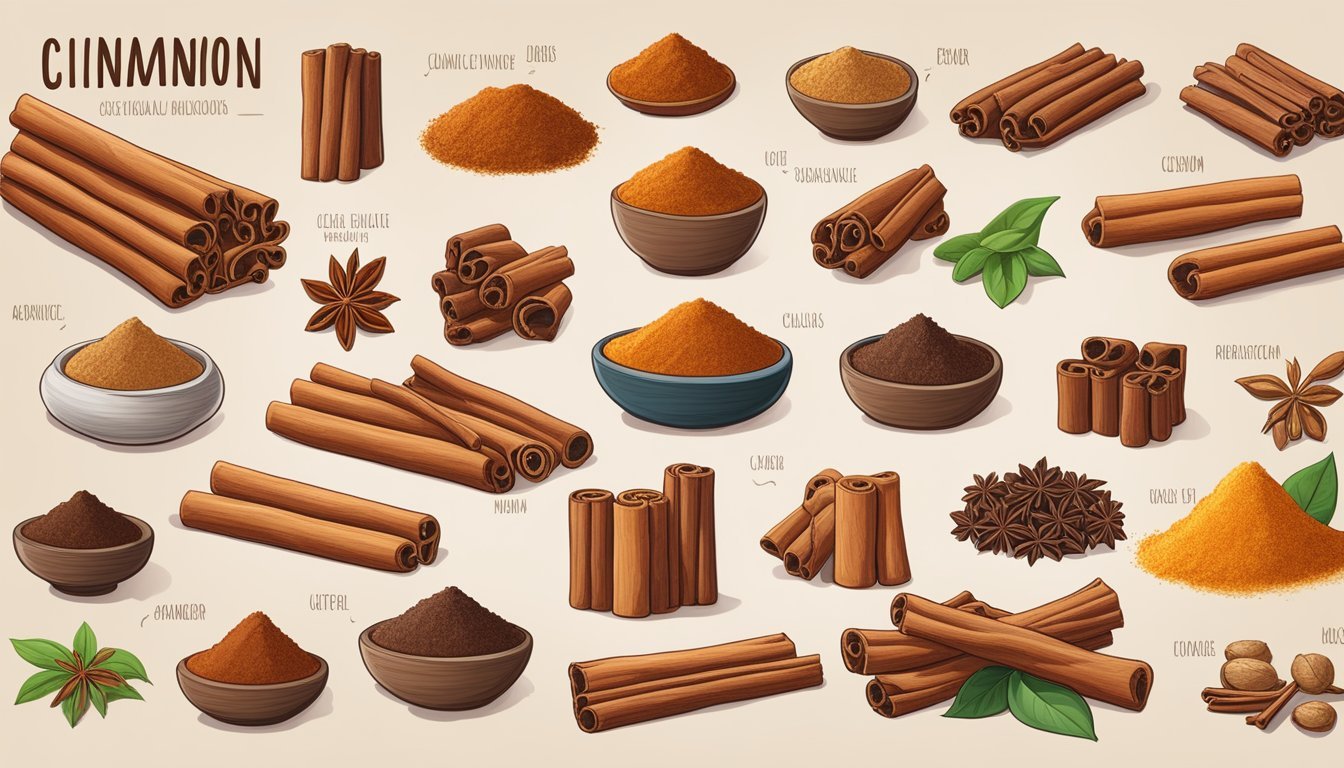Can Consuming Cinnamon Help Lower Blood Pressure?
Uncovering the Facts
High blood pressure is a common health concern that affects millions globally, leading to an increased risk of heart disease and stroke. Traditional medicine and contemporary research have explored various natural remedies for managing blood pressure levels, and cinnamon has garnered attention in this context. Cinnamon is a spice obtained from the inner bark of trees belonging to the genus Cinnamomum, and it's been used both as a culinary ingredient and in medicinal preparations for centuries.
Recent studies highlight the potential of cinnamon in lowering blood pressure among those with pre-existing cardiovascular conditions. It is thought that the spice's properties might influence blood pressure by acting on the body in several ways, such as improving circulation or enhancing the action of insulin. Research indicates that specific types of cinnamon, particularly cassia cinnamon, are most commonly utilized for these health benefits in the United States.
While there is evidence suggesting a positive effect of cinnamon on blood pressure control, the scientific community emphasizes the need for more robust, large-scale research to fully understand the mechanism and to substantiate the efficacy of cinnamon as a treatment option. Given the complexity of cardiovascular health, experts advise that cinnamon should not replace the conventional therapies for blood pressure management but may be considered a supplementary measure pending further validation.
The Role of Cinnamon in Blood Pressure Regulation
Recent discussions and studies have centered around the role that cinnamon may play in the regulation of blood pressure. This section delves into the intricacies of blood pressure management and how compounds found in cinnamon might influence cardiovascular health.
Understanding Blood Pressure and Its Importance
Blood pressure is the force exerted by circulating blood on the walls of blood vessels. It's a vital sign used to measure the health of the cardiovascular system. Hypertension, or high blood pressure, is a condition where this pressure is consistently too high, which over time can lead to serious health issues such as heart disease and stroke.
Cinnamon's Potential Effects on Blood Vessels
Cinnamon contains various compounds which are thought to benefit the cardiovascular system. Studies suggest these compounds may dilate and relax blood vessels. This vasodilation could potentially lead to a decrease in blood pressure. Research, however, shows mixed results and underscores the need for more robust evidence to confirm cinnamon's efficacy in blood pressure management.
Cinnamaldehyde and Blood Pressure Modulation
Cinnamaldehyde, the compound responsible for cinnamon's characteristic flavor and odor, might play a part in modulating blood pressure. This component of cinnamon is believed to induce vasodilation and relax the blood vessels, thereby possibly assisting in the reduction of blood pressure. However, the extent of cinnamaldehyde's impact on hypertension is not yet fully understood and warrants further investigation.
Cinnamon Types and Their Properties
Cinnamon is a spice derived from the bark of evergreen trees within the genus Cinnamomum, and its properties vary depending on the specific type of cinnamon. These properties can influence both the spice's culinary uses and its potential health benefits.
Cassia Versus Ceylon Cinnamon
Cassia cinnamon is the more commonly available type in the United States, originating from Southeast Asia. It is characterized by a strong, spicy flavor. Ceylon cinnamon, also known as "true cinnamon," is native to Sri Lanka and parts of India and is milder and sweeter in taste. Utilized more often in culinary applications, Ceylon cinnamon is also considered to carry fewer health risks when consumed in large amounts due to its lower coumarin content.
Nutritional Content and Active Compounds
Cinnamon is rich in a variety of active compounds that contribute to its aroma, flavor, and potential health benefits. The main active ingredients are cinnamaldehyde, cinnamic acid, and cinnamate. Cinnamon also contains several antioxidants, such as polyphenols. In terms of nutritional content, cinnamon provides:
Fiber
Manganese
Calcium
Iron
The specific concentration of these nutrients can differ between cassia and Ceylon cinnamon.
Relevance of Coumarin in Cinnamon
Coumarin is a compound found in both types of cinnamon, but at notably different levels. Cassia cinnamon contains a higher concentration, which has been linked to potential health risks if consumed in significant quantities over extended periods. On the other hand, Ceylon cinnamon contains much lower coumarin levels, making it a safer option for regular consumption. It's important for consumers to be aware of these differences, especially for those looking to use cinnamon as part of their dietary regimen for blood pressure management.
Scientific Research on Cinnamon and Health
Recent studies have highlighted potential health benefits of cinnamon, specifically in regulating cholesterol and blood sugar levels, along with its antioxidant properties. These findings suggest that cinnamon may play a role in managing certain conditions like type 2 diabetes and high blood pressure.
Impact of Cinnamon on Cholesterol Levels
Cholesterol Management: Research indicates that cinnamon consumption may influence cholesterol levels. A randomized trial showed that after 40 days, participants consuming cinnamon did not exhibit substantial changes in their lipid profile, including cholesterol levels, compared to a control group. However, it is noted there was a significant difference in HDL cholesterol (often considered the "good" cholesterol) in the cinnamon group at the baseline.
Cinnamon Intake and Blood Sugar Control
Blood Sugar Regulation: Studies point to cinnamon's capacity to aid in blood sugar control, an essential aspect for managing diabetes, specifically type 2 diabetes. During the intake periods of up to 40 days, reports noted a decline in postprandial glucose levels in individuals consuming cinnamon. This suggests that it may help moderate post-meal blood sugar spikes, which is valuable for glucose management in diabetic patients.
Study Findings on Cinnamon's Antioxidant Effects
Antioxidant and Anti-inflammatory Properties: Cinnamon has been recognized for its antioxidant and possible anti-inflammatory effects, which could relate to a lower risk of heart disease. Subgroup analysis from meta-analysis infers that these outcomes are particularly significant when cinnamon is consumed in doses of 2 grams or less per day, over an extended period, and notably in individuals with a baseline body mass index (BMI) of 30 kg/m^2 or more. These findings suggest that regular, moderate cinnamon supplementation can enhance overall health by reducing oxidative stress and inflammation.
Integrating Cinnamon into Your Diet
Cinnamon, known for its blood sugar regulation properties, can be incorporated into daily diet through cooking, as a dietary supplement, or added to various beverages. The key is to utilize cinnamon in a way that complements dietary habits and promotes a balanced lifestyle.
Cinnamon as a Culinary Spice
Cinnamon is a versatile spice that can be used to add flavor to a range of dishes. Given its warm, sweet, and woody flavor profile, it works well in both sweet and savory recipes. Cinnamon powder can be easily sprinkled on oatmeal, added to smoothies, or incorporated into baking recipes to enrich flavor. In its whole form, cinnamon sticks can be used to infuse flavor into hot drinks, such as cinnamon tea, or included in the cooking process of stews and curries for a subtle spice note.
Cinnamon Supplements and Their Usage
For those considering a more concentrated intake, cinnamon is available as a dietary supplement in the form of capsules or tablets. When selecting a cinnamon supplement, it's important to opt for high-quality products from reputable sources. Adhering to the recommended dosage on the product label is crucial; typically, supplements with at least 1.5 grams of cinnamon are suggested for potential blood sugar benefits, but it's always best to consult with a healthcare provider before beginning any new supplement regime.
Incorporating Cinnamon into Meals and Beverages
There are creative and simple ways to incorporate cinnamon into meals and beverages. Here's a brief guide:
Morning meals: Sprinkle cinnamon on yogurt or incorporate it into a fruit smoothie.
Lunch and dinner: Add ground cinnamon to spice rubs or marinades for meats.
Snacks: Mix cinnamon into nut butters or sprinkle on toast with honey.
Beverages: Stir cinnamon powder into coffee or tea, or add a cinnamon stick for a burst of flavor.
Using cinnamon in various forms—whether as a whole spice for infusion or ground powder for direct flavoring—can contribute to both the palatability and potential health benefits of a diet.
Cinnamon's Broader Health Benefits
Cinnamon is not only a popular spice but also noted for its significant health benefits, which span from anti-inflammatory properties to metabolic syndrome management. Its role in traditional medicine is underscored by scientific studies, suggesting its positive impact on various health aspects.
Effects on Inflammation and Immune Function
Cinnamon has been identified to contain compounds with anti-inflammatory properties. These include cinnamaldehyde and cinnamic acid, both of which have been studied for their ability to inhibit inflammation in the body. By reducing inflammation, they may positively affect the body's immune function, as chronic inflammation can suppress immune responses.
Cinnamon's Role in Weight Management
In terms of weight management, cinnamon may play a supportive role. It has been observed that the spice can potentially influence metabolic rate, although the mechanisms are not fully understood. It is proposed that cinnamon consumption could aid in weight loss efforts, possibly by altering the metabolism of fats and sugars in the body.
Potential for Diabetes and Metabolic Syndrome Management
For individuals managing diabetes or metabolic syndrome, cinnamon's potential effects on blood sugar levels have garnered attention. It is believed that cinnamon might improve insulin sensitivity, which in turn can help in the regulation of blood glucose levels. Consistent with this are studies suggesting cinnamon might help lower fasting blood sugar when included as part of the diet.
While the aforementioned benefits highlight cinnamon's potential in various health aspects, it should be consumed in moderation and not viewed as a standalone treatment. It's also critical for individuals to consult healthcare providers before using it as a supplement, particularly for those with health conditions or those taking medication.
Safety and Side Effects of Cinnamon
While cinnamon is renowned for its health benefits like potentially lowering blood pressure, it is critical to understand its safety and side effects. The following subsections will address the toxicity of cinnamon, safe consumption guidelines, and its impact on liver health, with a focus on vulnerable populations.
Understanding Cinnamon Toxicity
Cinnamon contains coumarin, a compound that can be toxic if consumed in high amounts. There are two main types of cinnamon — Ceylon (often referred to as "true" cinnamon) and Cassia. Cassia cinnamon is more commonly found in grocery stores and contains higher levels of coumarin compared to Ceylon cinnamon. High coumarin intake may lead to toxic effects, which can vary from mild to severe and include symptoms like:
Liver damage
Increased risk of cancer (in animal studies)
Safe Consumption Guidelines and Dosage
To mitigate the risk of toxicity, the European Food Safety Authority recommends a daily intake of no more than 0.1 mg of coumarin per kilogram of body weight. For a 70kg adult, this would mean a maximum of 7 mg of coumarin per day. Here is a succinct guideline for cinnamon consumption:
Adults should limit their intake of Cassia cinnamon to 0.5-1 teaspoon per day.
Ceylon cinnamon has much lower amounts of coumarin and is safe in higher amounts.
Following these dosage guidelines can help prevent the adverse effects associated with coumarin.
Impact on Liver Health and Considerations for Vulnerable Populations
Individuals with pre-existing liver disease may need to exercise additional caution with cinnamon consumption due to the increased risk of liver damage. Coumarin's toxic impact on the liver can exacerbate existing liver conditions. Therefore, such individuals are advised to opt for Ceylon cinnamon or avoid cinnamon altogether, based on medical advice.
Furthermore, vulnerable populations, including pregnant and breastfeeding women, should be cautious. Insufficient evidence exists to conclusively determine the safety of high cinnamon intake during pregnancy and breastfeeding. When in doubt, these groups should consult healthcare providers to individualize their consumption guidelines.
The Cultural and Historical Significance of Cinnamon
Cinnamon, with its distinctive aroma and taste, has played a significant role in cultural traditions and global cuisine for centuries. It has been valued both in savory and sweet dishes and has a storied history in traditional medicine.
Cinnamon's Origins and Global Spread
Origin:
Region: Southeastern Asia
Harvest: Inner bark of Cinnamomum trees
Global Spread:
Ancient Egypt: Embalming and preservative
Middle Ages Europe: Rarity and symbol of wealth
Spice Trade: Expansion to Mediterranean and beyond
The earliest records of cinnamon date back to Ancient China, where it has been used since at least 2700 BCE. Recognized as an important commodity in the spice trade, cinnamon's value surged, especially in the Mediterranean region. It hailed from the mystical lands of Southeastern Asia and found its way into the annals of history, not merely as a flavoring agent but also as a symbol of wealth and prestige during the Middle Ages in Europe.
Traditional Uses of Cinnamon in Medicine and Cooking
Medicine:
Use: Traditional medicine systems like Ayurveda and Traditional Chinese Medicine
Purported Benefits: Digestive issues, diabetes management, anti-inflammatory properties
Cooking:
Sweet Dishes: Baked goods, desserts, teas
Savory Dishes: Meats, curries, stews
In traditional medicine, cinnamon has been leveraged for its purported health benefits, including its anti-inflammatory and antioxidant effects. In Ayurveda and Traditional Chinese Medicine, it is often utilized to treat a variety of ailments from colds to digestive problems. As a culinary ingredient, it imparts a warm, aromatic flavor to both sweet and savory dishes. It is a mainstay in the creation of numerous baked goods, while also adding complexity to savory dishes across many cultures.
Concluding Remarks on Cinnamon and Blood Pressure
Research into the effects of cinnamon on blood pressure has garnered attention due to the potential health benefits of this common spice. While cinnamon is widely recognized for its sweet aroma and flavor, its potential impact on heart health, specifically through blood pressure regulation, is an area of scientific interest.
Clinical studies indicate mixed outcomes with some suggesting cinnamon may modestly lower blood pressure. These findings are not conclusive across all studies and highlight the need for further, more robust research. The small sample sizes and the short duration of many trials limit their generalizability. Despite differing results, a notable point is the absence of significant adverse effects, suggesting cinnamon may be a low-risk addition to diet.
Those living with hypertension, a key risk factor for heart disease, are often advised to incorporate lifestyle changes to manage their condition. In this context, cinnamon supplementation can be considered as part of a broader dietary strategy. It should be noted, however, that cinnamon should not replace prescribed medication but rather could be an adjunct therapy.
Given the current evidence, health professionals may cautiously consider recommending cinnamon as a supplementary measure for individuals with blood pressure concerns, while emphasizing the importance of a balanced diet and regular physical activity. It remains critical for individuals to consult with their healthcare provider before making any significant changes to their health regimen.
In summary, while cinnamon's role in lowering blood pressure shows potential, it should be employed as part of a comprehensive health strategy. Further investigations are warranted to better understand the capacity of cinnamon in the management of hypertension and overall cardiovascular health.






